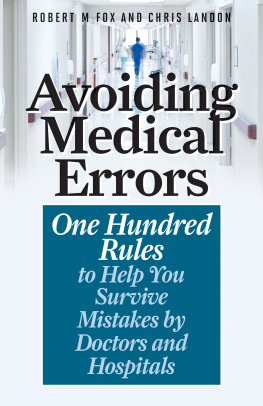George Anders - Health Against Wealth
Here you can read online George Anders - Health Against Wealth full text of the book (entire story) in english for free. Download pdf and epub, get meaning, cover and reviews about this ebook. year: 1998, publisher: HarperCollins, genre: Romance novel. Description of the work, (preface) as well as reviews are available. Best literature library LitArk.com created for fans of good reading and offers a wide selection of genres:
Romance novel
Science fiction
Adventure
Detective
Science
History
Home and family
Prose
Art
Politics
Computer
Non-fiction
Religion
Business
Children
Humor
Choose a favorite category and find really read worthwhile books. Enjoy immersion in the world of imagination, feel the emotions of the characters or learn something new for yourself, make an fascinating discovery.
- Book:Health Against Wealth
- Author:
- Publisher:HarperCollins
- Genre:
- Year:1998
- Rating:3 / 5
- Favourites:Add to favourites
- Your mark:
- 60
- 1
- 2
- 3
- 4
- 5
Health Against Wealth: summary, description and annotation
We offer to read an annotation, description, summary or preface (depends on what the author of the book "Health Against Wealth" wrote himself). If you haven't found the necessary information about the book — write in the comments, we will try to find it.
The HMO system is supposed to stop greedy doctors and hospitals from viewing patients as sources of profit. But Health Against Wealth reveals that when you are confronting a medical emergency, the HMO systems cost-saving rules can jeopardize your life. This book, said the Cleveland Plain Dealer, is a chilling portrait of the many ways in which HMOs can be hazardous to your health.
Health Against Wealth — read online for free the complete book (whole text) full work
Below is the text of the book, divided by pages. System saving the place of the last page read, allows you to conveniently read the book "Health Against Wealth" online for free, without having to search again every time where you left off. Put a bookmark, and you can go to the page where you finished reading at any time.
Font size:
Interval:
Bookmark:
FOR MY PARENTS,
AND FOR BETSY
Copyright 1996 by George Anders
All rights reserved.
For information about permission to reproduce selections from this book, write to or to Permissions, Houghton Mifflin Harcourt Publishing Company, 3 Park Avenue, 19th Floor, New York, New York 10016.
hmhbooks.com
Library of Congress Cataloging-in-Publication Data
Anders, George, date.
Health against wealth: HMOs and the breakdown of
medical trust / George Anders.
p. cm.
Includes bibliographical references and index.
ISBN 0-395-82283-1 ISBN 0-395-82282-3 (pbk.)
1. Health maintenance organizationUnited States.
I. Title.
RA 413.5. U 5 A 55 1996
362.10425dc20 96-24869 CIP
eISBN 978-0-547-62798-4
v2.0719
When the hardcover edition of Health Against Wealth appeared in November 1996, the HMO industry appeared invincible. Overall membership was soaring by more than 150,000 a week, and the executives who ran the biggest health maintenance organizations boasted of even greater advances to come. Regulation was lax in a political climate that favored market-based solutions for almost any tough issue, including Americas many health-care problems. In such a setting it would have been easy to write an ode to the business successes of HMOs. But patients and doctors had a different story to tell. For many of them, the managed care offered by these health plans meant denial of care or unwarranted delays and red tape in getting medically necessary attention. In writing this book, I wanted to give frustrated patients and doctors a voice, while encouraging people in positions of power to think about ways to make HMOs work better. My hope, in short, was that this book would make a difference.
Soon after this book went on sale, I began to receive intense feedback from readers. A Nevada nurse wrote that the book had strengthened her resolve to fight against false economies in heart care. A doctors group in North Carolina ordered two hundred copies of Health Against Wealth, to be distributed to state legislators as they considered ways to regulate managed-care plans more effectively. Patients and patient advocates began sharing dozens of stories of health care gone awry, sometimes wanting the intercession of a journalist, sometimes just wanting someone to listen. One of the most heartening calls came from a leading health-care consultant on the East Coast, who said that the books reporting on managed care in Tennessee was making her think twice about how rapidly she should be encouraging other states to nudge their indigent Medicaid populations into HMOs and other such plans.
Meanwhile, groups with a stake in the American health-care system came to me with speaking invitations, wanting to hear about what workedand what didnt workin our current system of managed care. For much of 1997 I crisscrossed the United States, sharing some of the books findings and conclusions with patient advocates, doctors, attorneys general, employers groups, and hospital administrators. At stops ranging from New Orleans to Denver, Boston, and Williamsburg, Virginia, I also tried to assess how managed care was evolving in each local marketplace. Were conditions getting better? I asked. Or were the problems documented in Chapters 1 through 12. of this book only getting worse?
The good news is that public scrutiny has been bringing positive results, at least in a few areas. Patients and doctors are becoming much more adept at pushing the managed-care system for better medical treatment rather than passively accepting whatever it decides to deal out. Leading consumer groups, such as Families USA, Consumers Union, and Public Citizen, are keeping a watchful eye on HMOs while helping their members become stronger negotiators. Guidebooks full of tips on dealing with managed care are proliferating, as this book had predicted. Physicians, meanwhile, are moving beyond blind hostility toward managed care and looking instead for ways to hold HMOs to higher standards. Some doctors groups are issuing their own report cards on HMOs, helping the public choose higher-quality plans and avoid the worst ones. Other physicians are forming their own unions or banding together in large practice-management organizations, ending the fragmentation of medical care that made it so easy for big HMOs to dictate doctors working conditions.
This desire to stand up to managed-care excesses has spilled into the regulatory arena. In early 1997 some states, such as New Jersey, Missouri, and North Carolina, enacted what amounted to a Bill of Rights for HMO members. New laws or regulations made it easier for members to get to the right medical specialist promptly and to appeal coverage denials quickly to independent reviewers instead of having the cases stalled in internal HMO grievance systems. Other provisions redefined emergency medical coverage in ways that made sense to patients instead of hewing to absurdly rigid definitions that might save money in the short term but could put members well-being at risk in a crisis.
The more progressive managed-care plans have noted this change in public sentiment and have tried to adjust accordingly. Health plans such as PacifiCare, Harvard Pilgrim, Tufts, and some of the Blue Cross companies talk about sharing more authority with patients, doctors, and employers. The HMO industry also has become less strident about its own narrowly drawn definitions of medical quality and a bit more willing to acknowledge that good patient care involves not just extensive preventive services like cholesterol checks but also appropriate care of the sick. Several of the countrys biggest nonprofit HMOs, including Kaiser Permanente, have gone so far as to advocate binding standards for all managed-care plans in areas such as appeals by members and coverage of experimental therapies, in effect issuing their own plea for greater regulation.
But the fundamental tensions of this book are hardly resolved, and some of them have actually grown more acute. In Chapter 3 I discuss the great tendency of managed care to focus on populations and to disregard individuals. Thousands of members become mere dots on a computer printout, viewed with aloofness by medical managers in high-rise office towers. Inevitably, this remoteness increases as health plans grow largerand the HMO industry recently has been on a merger spree. The health plans run by Malik Hasan merged in 1997 with Foundation Health to form Foundation Health Systems, a company overseeing the care of five million people. The Cigna insurance colossus acquired HealthSource, a fast-growing New Hampshire HMO, pushing its membership ever higher. Industry leaders such as United HealthCare, Humana, Wellpoint, and PacifiCare continue to grow by acquisition. Such transactions may increase marketing clout, but they leave consumers with fewer choices for health coverage, while running the risk of even greater detachment.
The grassroots movement for HMO reform, meanwhile, continues to run into opposition from the managed-care industry and its allies in the business sector. Virtually any effort to improve delivery of care is portrayed by lobbyists as having a potentially ruinous impact on overall medical costs. The calculations of added costs often are based on dubious assumptions, but in the heat of a lobbying battle, a spurious number may be more effective than a valid one. Many such tactics are described in Chapter 12, which chronicles the activities of the best lobbyists in America as they fought to block a consumer-protection bill in Texas in 1995. Those themes played out again in 1997 in California, our most populous state, when nearly a dozen pro-consumer bills were vetoed by Governor Pete Wilson late in the year. In many states, critics of managed care now are strong enough to overcome such opposition. But on a national scale the balance of power is not so clear. As of late 1997, despite many months of trying, Congress and a new presidential commission on the quality of managed care have yet to accomplish much.
Font size:
Interval:
Bookmark:
Similar books «Health Against Wealth»
Look at similar books to Health Against Wealth. We have selected literature similar in name and meaning in the hope of providing readers with more options to find new, interesting, not yet read works.
Discussion, reviews of the book Health Against Wealth and just readers' own opinions. Leave your comments, write what you think about the work, its meaning or the main characters. Specify what exactly you liked and what you didn't like, and why you think so.









